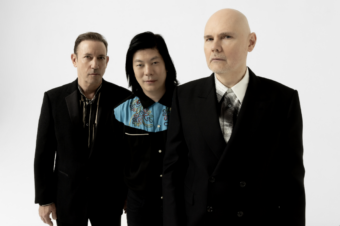Andrew Vanwyngarden and Ben Goldwasser are talking in hushed, hurried tones to a stuffed border collie. Crouching low, noses to snout, they take turns mumbling into a BlackBerry and then holding it up to the puppy’s left ear. Their furrowed brows and tender pats suggest concern. The puppy’s state of mind, however, is inscrutable — sunglasses conceal his eyes, and his furry tongue dangles jauntily. A leafy sprig hangs from the scarf tied around his noggin. Perhaps he be tripping.
Ten yards away, barricaded in front of Toronto’s tony department store Holt Renfrew for the Toronto International Film Festival kickoff bash, paparazzi and camera crews grow visibly anxious. They’ve been told that MGMT, the party’s main attraction (and stars of sponsor Converse’s new ad campaign), are on their way. “There they are!” yells a woman, pointing her microphone. The 25-year-olds stroll toward the black carpet, possibly addled stuffed pooch in hand. They stop in front of the logo-laden backdrop, and an onslaught of flashbulbs and questions begins — “How do you like Toronto?” “Are you going to see any films?” “Are you excited to be here?”-none of which they answer. Then, finally, a howling voice gets through: “Who are you with?”
“Chauncey,” VanWyngarden replies, walking away.
The reporters are not amused. “What, no interview?” one man cries. “This is ridiculous!” Chauncey and his handlers leave without another word to take refuge in the store’s makeshift greenroom. VanWyngarden removes the dog’s shades to reveal two amber plastic globes. “He’s thinking about decorating his loft with Lebanese furniture,” he says to no one in particular, giggling.
VanWyngarden — the shaggy, Marc Bolan–esque dandy — is in good spirits, despite being exhausted from the previous evening. MGMT performed at a New York Fashion Week party, complete with attendant Olsen twin, but he doesn’t remember actually playing. He does remember drinking a lot of Maker’s Mark and “trying really hard to stay in control,” but not throwing pillows at security or fleeing into the streets or stumbling into a homeless shelter. “I guess I was pissed off at the party,” he says. He recalls getting thrown out of the shelter, whiskey bottle in hand, and being picked up on a sidewalk by two ladies who gave him water; he woke up at 5:30 in the morning on their futon. Goldwasser — intense, dark-eyed, and mercurial — looks at his partner in disbelief and sheepishly offers, “This is not typical for us.”
What’s considered typical for MGMT is changing by the minute. The group began as a joke designed to annoy their college classmates, then scored a major-label deal without even trying and played Letterman before their debut album, Oracular Spectacular — a spacey cycle of catchy psych pop steeped, sonically and aesthetically, in a world they call “future ’70s” — was released. Since then, they’ve played every big festival around the world, toured with Radiohead, sold nearly 200,000 albums in the U.S., and become unlikely fashion-world icons. At a time when a band’s cultural cachet is often exhausted before their album even comes out, MGMT’s steady rise, a full ten months after Oracular‘s release, feels suitably anachronistic.
Picking at the vegetables and hummus in the greenroom are the duo’s longtime friends enlisted for their live band: guitarist James Richardson, bassist Matt Asti, and drummer Will Berman. In the corner are three of Chauncey’s pals — or, as specified in the standard MGMT rider, an “assortment of puppies.” Aside from playing a live set, they’ve all agreed, their two managers included, to moonlight as DJs at the party, taking turns in pairs. “I want to DJ with Ben,” VanWyngarden says. He beams goofily toward Goldwasser, who smiles shyly back. Goldwasser slides headphones on and scours his laptop for a playlist. Pizza is ordered, drinks are made, and Kirsten Dunst, who’s been linked to VanWyngarden, flickers on a nearby TV.
Down an escalator, past mahogany shelves full of cashmere sweaters, cakes and cookies have been strewn across a long table beside hills of shrimp on ice. L.A.-style cougars meander in new dresses. Jeremy Piven is lurking. The black- and-white-checked dance floor, where no one dared tread all night, quickly fills as the band takes the stage, puppies in tow. Even Phoenix Suns point guard and real-life Canadian Steve Nash, who had been holding up the wall, sways in his designer suit. Halfway through MGMT’s last song, the euphoric, synth-driven anthem “Kids,” VanWyngarden unbuttons his shirt, tears the fluffy innards out of a white poodle, and sticks the hollowed body on his head, the jet-set crowd cheering his flair for accessorizing.
An hour later, the guys congregate in VanWyngarden’s Four Seasons suite, a step up from their usual less-than-five-star, two-to-a-room digs. VanWyngarden orders crème brûlée and chocolate ice cream from room service and then draws two heads (one human, one elephant) on a sketch pad to start an exquisite corpse, passing it on to Asti for the body. Joints are rolled and verses are invented; an ode to their pizza dinner is born. “Gorgonzola? / Are you out of controlla? / All I want is mozzarella and tomatoes with ma soda,” sings VanWyngarden. “Hey,” he calls out, “is it too late to get a massage?”
VanWyngarden and Goldwasser met in 2001 as freshman music majors at Wesleyan, an out-there liberal arts university in Middletown, Connecticut, that encourages absurdist self-expression the way MIT encourages studying. They lived in the clothing-optional, artist-populated dorms known as WestCo, where minutes of student meetings are chronicled in a journal called “The Book of Love.” As president of his building, VanWyngarden organized parties and concerts, including ones for Zonker Harris Day, the annual bacchanal at which, as Goldwasser puts it, “People who wouldn’t normally eat mushrooms eat mushrooms.”
If the hoary rock-star-as-rebel myth isn’t dead yet, MGMT should kill it off once and for all, as they’re well-adjusted kids who dote on Mom and Dad, internalizing their parents’ values rather than reacting against them. “I didn’t find out until I was older that they were hippies,” says Goldwasser, whose mom is a gardener and father a veterinarian. “When I realized how big a deal it was to be a part of something like that, I became really fascinated with the ’60s.” VanWyngarden’s mom is a former photographer who lives in Santa Fe, New Mexico, with her painter boyfriend, and his dad is editor of the alternative newspaper Memphis Flyer. “I didn’t smoke pot with them until I was in college,” VanWyngarden says. “And they were just like anyone else, giggling and getting the munchies.”
Though their parents were progressive, the pair’s formative years were spent in conservative towns — Goldwasser grew up in Westport, New York (population 1,287), and VanWyngarden in Memphis — so Wesleyan was a place they could unfurl their freak flags. “We bonded over it suddenly being cool to be weird,” Goldwasser says. Christening themselves the Management (they later changed the name to avoid confusion with another band), they started writing ridiculous-by-design songs in different genres and singing karaoke-style to an iPod at unhinged campus shows, the first of which saw them play a 45-minute instrumental of the Ghostbusters theme.
“We were less about quality, more about absurdity,” VanWyngarden recalls. “We were trying to be obnoxious, but somehow people got into it,” adds Goldwasser. They had other outlets: Goldwasser played various instruments in classic-rock and blues, prog, and indie bands; VanWyngarden dabbled in an ’80s monster ballads band, a Patsy Cline cover band, and a hip-hop group. But it was their infectious, sharp-witted songs like “Kids” and “Time to Pretend,” a potentially prophetic ode to the hedonistic, rock-star trajectory (“Let’s make some music / Make some money / Find some models for wives”), that made others take them seriously, even if they themselves didn’t.
Wesleyan students began circulating CD-Rs to friends at other schools along the Eastern seaboard, so MGMT took their show on the road. At Princeton, guys in pink polos and seersucker shorts sang along from the front row. An a cappella group at the University of Virginia added “Kids” to their repertoire. Two NYU students, Will Griggs and Jesse Israel, became hooked and wanted to manage them. “The first time I saw Andrew, he was frolicking on a field around a giant inflatable bear,” Griggs recalls. He and Israel joined forces with a high school student from L.A., Nick Panama, who felt similarly compelled, scrounging up $800 each to form Cantora Records and, they hoped, record the first MGMT EP. But it took some convincing.
“We were shocked,” Goldwasser says. “They were the first people who thought of us as a real band — we definitely didn’t.” After releasing the Time to Pretend EP in January 2005, they celebrated their graduation that summer by touring with fellow glam oddballs Of Montreal. But rather than capitalize on this momentum, MGMT simply ceased to be — Goldwasser stayed in Middletown for six months before spending a summer building eco-friendly straw-bale houses near the Catskills, while VanWyngarden landed in Brooklyn, living with a girlfriend and only sporadically looking for jobs on Craigslist. By fall 2006, Goldwasser moved to Brooklyn as well, but pursuing the band further wasn’t a priority.
Meanwhile, Maureen Kenny, an A&R rep at Columbia Records, was trying to track them down. An intern had slipped her the EP, which Kenny couldn’t stop listening to. When she finally found them and brought them to Manhattan’s Peninsula Hotel for some old-fashioned wining and dining, Kenny recalls, “They ordered the most expensive drinks — $24 Bellinis — and Andrew asked if they’d get fur coats. And then they e-mailed me a dream list of producers that included Barack Obama and ‘not Sheryl Crow.’ ”
Their sincere choice was Dave Fridmann, who sprinkled similar stardust on the Flaming Lips. VanWyngarden and Goldwasser spent the winter of 2007 writing new tunes and recording demos, which Fridmann passed on to the Lips’ Wayne Coyne. (“We listened thinking, ‘What do they need a producer for?’ ” Coyne recalls. “They already knew what they wanted.”) When it came time to record at Fridmann’s Tarbox Road Studios in bucolic Cassadaga, New York, the duo played every instrument, as they later did on the recently released 14-minute single “Metanoia.” “They have this twin-style communication between them,” Fridmann says. “Their musical discovery is happening really quickly; they’re just plowing through.”
The process wasn’t without bumps, however. Lines like “We’re gonna keep you on the run / We got the handshake under our tongue” on “The Handshake,” one of Oracular Spectacular‘s darker songs, betray reservations about even signing with Columbia. “The handshake is the deal,” VanWyngarden says. “I was thinking about a mental asylum, when a patient tricks the nurse by keeping the pills under his tongue, then spits them out when she walks away.”





